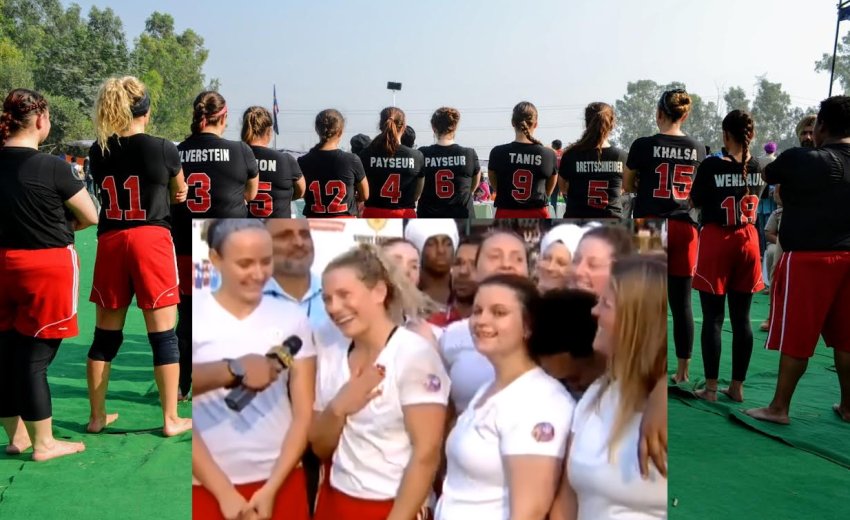World Kabaddi Cup - US Women's Team
The World Kabaddi Cup just wrapped up in the Punjab and the US Women's Team did extraordinarily well, coming in an unexpected second place.
The US Women's Kabaddi Team
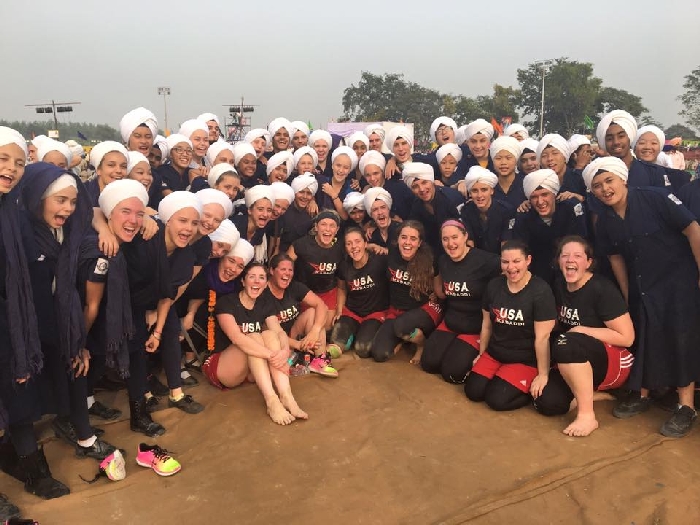 |
| US Team with MPA Students |
The US Women's Kabaddi Team has been managed by Mohinder Siddhu since the team first formed five years ago. At first, the team was made up primarily of Miri Piri Academy (MPA) graduates, who had grown up playing Kabaddi while attending school in India. Over time, the team has expanded to include cross over athletes who are skilled in rugby, jiu jitsu and football. There's now a dedicated group of women who have fallen in love with the sport and practice regularly in New Jersey and over on the west coast. This year's team still had four MPA graduates and students playing, including the captain and top raider, Guru Amrit Hari Kaur Khalsa.
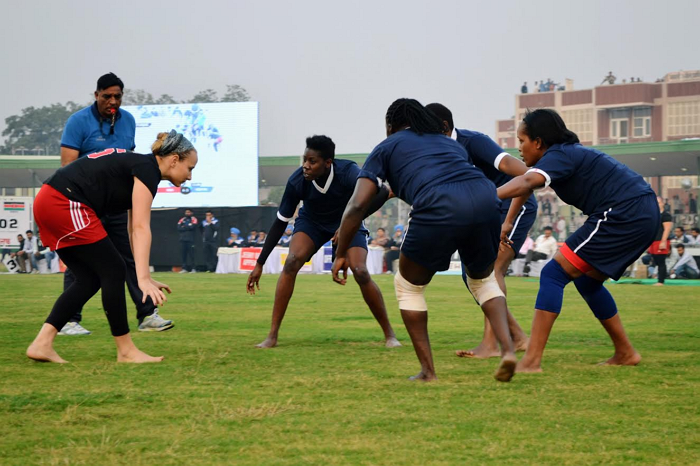 |
| Guru Amrit Hari Kaur Khalsa faces off with Kenyan team. |
The 2016 World Kabaddi Cup
The US team went into this year's World Kabaddi Cup hopeful but with few expectations. At the 2015 World Cup they lost all of their matches but spent the last two years working hard to develop their skills individually and as a team. Their first game against Sierra Leone set the tone for the entire competition. They came out strong, showing that they had not only solid individual players but good teamwork as well. They won that first game against Sierra Leone and went on to beat Tanzania. This gave them some confidence but their egos were still in check. Both Sierra Leone and Tanzania are new teams; New Zealand would be their real test.
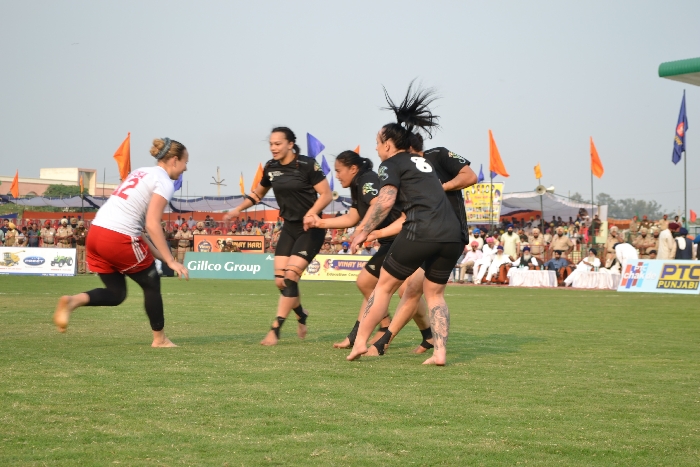 |
| Guru Amrit Hari Kaur Khalsa US team top raider VS New Zealand |
The game against New Zealand was the break-through game for the US. They beat the strong and intimidating New Zealand in an intense match ending in a 29-28 victory for the US. To Guru Amrit Hari Kaur, this was a marker for how far the US team had come in the last year and it put them in the semi-finals against Kenya, who came second in their pool. Not knowing what to expect from Kenya, they keep their heads in the game and came out victorious.
The US/New Zealand Match:
Their final match, for first place, was against the indomitable team India; a team with impeccable skill and talent. They lost that match but were thrilled to have come in second. They'd come a long way in a year and were inspired by India's skill and ability to stay calm and neutral under pressure. Playing India showed them how far you can go with the sport and in what areas they can still improve.
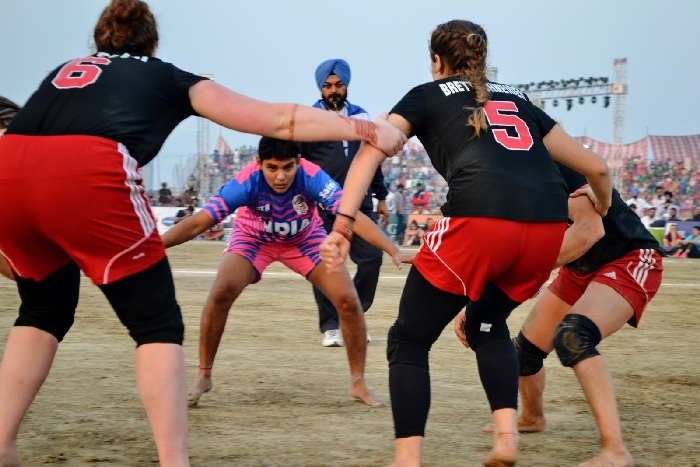 |
| US vs India |
Kabaddi, Training the Sant Sipahi
Originating in the Punjab, kabaddi comes from the soil of the Gurus, training the psyche of the sant sipahi, the saint soldier. Along with strength, the game demands mental clarity and a reliance on unconquerable spirit.
| MPA students |
Guru Amrit Hari Kaur Khalsa, the captain of the US Team and their top raider, was raised as a Sikh. She attended Miri Piri Academy as a child, where she started learning kabaddi at the age of seven along with other aspects of the Sikh path. Here's what she had to say about the role of Sikhism in kabaddi:
"We're taught as Sikhs and as Sikh women, that we're strong; that we can serve and take care of people just as well as any one else can. When somebody's in need of help, we help too. Whether we're a man or a woman; Mai Bhago shows us that. If we need to take the sword, we can and I think Kabaddi gives us the confidence and the strength to know that we can, rather than just think that we should.
The Sikh spirit and the warrior spirit plays a big part of the game. Whenever I'm nervous or intimated that the other team is stronger or smarter than I am, I go immediately to Gobinde Mukande or Chatra Chakra Varti because those two mantras remind me that it doesn't matter how strong they are, I'm strong inside of myself and I have way more than just my body and my mind to support me. I have every Sikh that has come before. That always raises my confidence so that even if I'm losing, I know that I'm not losing strength or courage or self-esteem, I just happen to be losing a point. And that really helps me stay mentally in the game.
For some people, being anxious makes them better at their sport; it gives them adrenaline and makes them feel more fearless. I try to balance that adrenaline and that fear with as much stability as I can so that I can be smart in my strength, rather than try to brute through it. I do that by meditating before each game. It helps me calm down and get to my center so that I can start the game calm and fresh."
Empowering Young Women Through Kabaddi
Guru Amrit Hari Kaur Khalsa teaches kabaddi to all of the girls who attend Miri Piri Academy and she sees the effect it has on their self esteem and confidence. Here's what she had to say about why kabaddi is such a great sport to teach girls:
"I think so many sports are based off of size, especially contact sports. One thing that I love about kabaddi is that you can be any size. There are some really heavy people, there are some really small people, tall people, short people. If you learn the style for your body type, you can be super effective in this sport. It shows you your limits and your strengths.
For some of the girls here at MPA, you see them come in for their first practice and they're scared to even do warm-up drills because it's in the dirt, the floor is rough and you have to be barefoot. A few weeks in, and all of a sudden, those same girls are attacking somebody's legs and diving at the floor with a huge smile on their face. They're excited about it. And when they walk off the field, they walk a little bit straighter and with more pride, knowing that they're strong. I think that's incredible. If that can spread to schools in America and throughout the world, I think it would really help girls build their self esteem; knowing that even if other people don't always take care of them, they can take care of themselves."
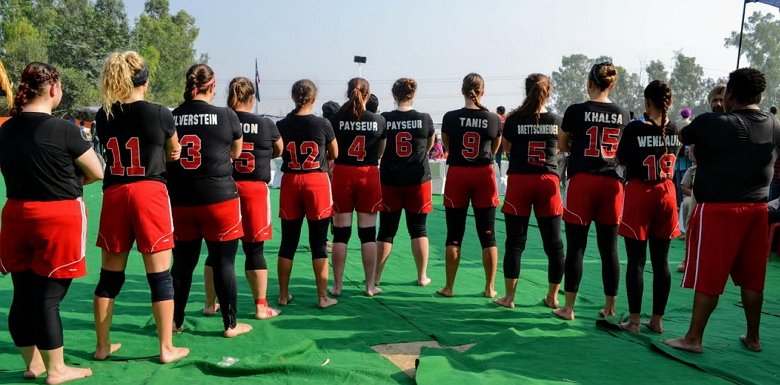
Moving Forward
The US Women's Team is already looking ahead to next year. After taking some much deserved rest, they'll start practicing and recruiting again in preparation for next year's World Kabaddi Cup.
Japjeet Khalsa
[email protected]